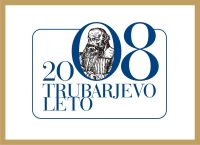|
Slovenia is celebrating Reformation Day on 31 October, remembering a turbulent yet culturally fecund period in the 16th century that produced the first book written in the Slovenian language and provided a key point of reference for Slovenian nation building centuries later.
On 31 October 1517 German priest Martin Luther hammered on a church door in Germany's Wittenberg 95 theses, ushering in a time of reform and of the emergence of new Christian groups.
With the advent of the printing press his ideas spread quickly around the whole of Europe. Protestantism, which grew out of this reform movement, reached well beyond Germany and it promoted the idea that the worship of God should be conducted in the mother tongue of the worshipers.
During the second half of the 16th century Reformation ideas flourished in the lands that make up present-day Slovenia. Culminating in the first ever Slovenian-language book and a translation of the Holy Bible, Protestantism left a deep mark on the predominantly Roman Catholic Slovenia.
The movement in Slovenia was epitomised by Primož Trubar (1508-1586), a Protestant priest who wanted to write books in a language which could easily be understood by all Slovenians. His "Abecedarium" spelling-book and "Catechism", published in 1550, gave Slovenians the first books in their own language.
Around 1580, the majority of townspeople and nobility in the predominantly Slovenian provinces of the Holy Roman Empire - Carniola, Styria and Carinthia - considered themselves Protestant, while the peasantry remained largely Catholic, in defiance of their feudal lords.
Protestantism only acquired a large peasant following in Prekmurje, NE - the region which was part of the Hungarian empire, where, unlike in Austria in 1606, Protestantism was not banned.
Prekmurje is also the region with the strongest Protestant community in the country at the present. According to the Evangelical Lutheran Church in Slovenia, their numbers stand at around 20,000.
Meanwhile, other Slovenian regions fell under the ban as part of which the Hapsburg lords and the Catholic Church suppressed the "Protestant heresy" by the Inquisition, persecution and by burning books. No Slovenian-language book was published from 1615 to 1675.
Nevertheless, the period did see the Church being reformed. An important role was played in Slovenia by the Jesuits, who were tasked to consolidate faith and recruit new educated people, a reason for which an education system started to develop.
Ultimately, Protestantism and Primož Trubar would stand alongside Romantic Poet France Prešeren (1800-1849) as vital cultural identifiers when Slovenia started to break free from the former Yugoslavia in the late 1980s.
Reformation Day has been a bank holiday in Slovenia since 1992. This year is is especially prescient, as it coincides with the 500th birth anniversary of Primož Trubar, which has been remembered with a series of events throughout what has been declared the Trubar Year.
Source: STA
|



